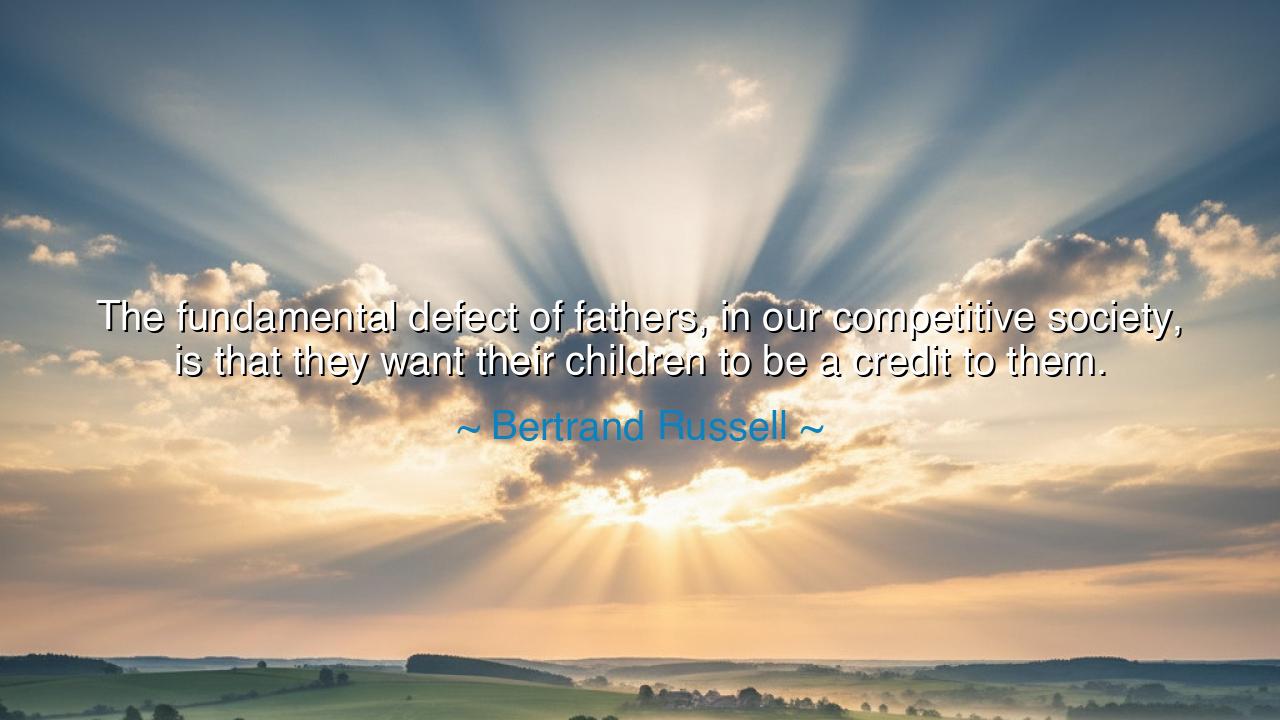
The fundamental defect of fathers, in our competitive society, is
The fundamental defect of fathers, in our competitive society, is that they want their children to be a credit to them.






The words of Bertrand Russell—“The fundamental defect of fathers, in our competitive society, is that they want their children to be a credit to them”—cut to the heart of one of humanity’s quietest tragedies. Beneath their calm phrasing lies a deep and sorrowful wisdom: that the love of many fathers, though meant to nurture, is often tainted by pride and comparison. Russell saw in the modern world a sickness of the soul—a world so consumed with achievement and reputation that even love became a measure of status. The father, who should be the guardian of his child’s spirit, too often becomes the architect of its burden. His desire is not always for the child’s freedom, but for the reflection of his own glory in the child’s success.
In the ancient world, philosophers and prophets alike warned of this hidden danger. The wise have always known that the parent who seeks to shape the child in his own image blinds himself to the child’s unique nature. True love, said the sages, is not possession but release. To want one’s child to be a credit to oneself is to make love conditional—to value the child not as a soul in becoming, but as a symbol of one’s worth in the eyes of others. Russell, who lived in an age of intellectual rivalry and social ambition, saw how even tenderness was infected by the fever of competition. The father who pushes his son toward success may think he is giving him strength, but often he gives him fear—fear of failure, fear of disappointing the one he most longs to please.
Consider the story of King Philip of Macedon and his son, Alexander the Great. Philip, a warrior and statesman, desired above all to be the father of a conqueror. He saw in Alexander not a son, but an extension of his own legacy. Alexander, driven by his father’s expectations, did indeed conquer much of the known world—but in his victories, he also inherited his father’s restlessness. He could never stop striving, for the shadow of Philip’s pride stretched always behind him. And so, even as he stood as master of empires, he found no peace. His glory was vast, but his heart was unquiet. This is the essence of Russell’s warning: that love, when mingled with pride, becomes tyranny, and that the soul raised for the sake of another’s honor may gain the world, yet lose itself.
The wisdom of Russell’s insight lies not in condemnation, but in compassion. For the father’s desire is born not from malice, but from the ancient yearning to continue himself through his children. Yet the flaw lies in forgetting that every soul must walk its own path. The father who demands that his child be his credit seeks immortality through control; the wise father seeks immortality through trust. One plants his image in another’s heart; the other plants the seed of freedom. The first may raise a successful man or woman, but the second raises a whole human being—capable of failure, capable of wonder, and capable of joy.
In truth, the defect Russell speaks of is not limited to fathers alone. It is a reflection of a society that worships status over spirit, appearance over essence. In a competitive society, love is easily mistaken for investment, and affection becomes a kind of transaction. Parents measure their worth by the triumphs of their children, rather than by the warmth of their bond. Yet the ancient teachers knew better. The Stoic Epictetus wrote: “Never say of a child, ‘He is mine,’ but only, ‘He is given to me for a time.’” To see one’s child not as possession but as trust, not as a mirror but as a flame, is the beginning of wisdom and the end of pride.
If we look to the example of Abraham Lincoln, we see a man who, though raised in hardship and obscurity, carried within him the gift of selfhood unshackled by expectation. His father, a rough and humble man, did not shape him into greatness through pressure or ambition. Rather, Lincoln’s character was forged by freedom and struggle, not by the need to be someone’s “credit.” The result was a man who, though burdened by sorrow, lived with compassion and authenticity. His greatness did not glorify his lineage—it glorified the human spirit itself. Such is the fruit of unconditional love: it releases the soul to grow in its own direction, to find its own measure of peace.
So, dear listener, take this teaching into your heart: if you are a parent, do not make your love a contest. Do not raise your child to validate your pride, but to discover their own truth. Let them fail, for failure is the seed of wisdom. Let them choose, for freedom is the soil of joy. Be not their master, but their witness; not their sculptor, but their gardener. The child is not a monument to your achievement, but a living soul entrusted to your care.
Thus, the wisdom of Bertrand Russell remains eternal: that the love which seeks credit is not love at all, but a shadow of ego. True fatherhood—and true humanity—lies in humility, in the willingness to let others shine with their own light. For the greatest honor a parent can earn is not to be glorified through the child, but to be remembered with quiet gratitude as the one who set them free.






AAdministratorAdministrator
Welcome, honored guests. Please leave a comment, we will respond soon